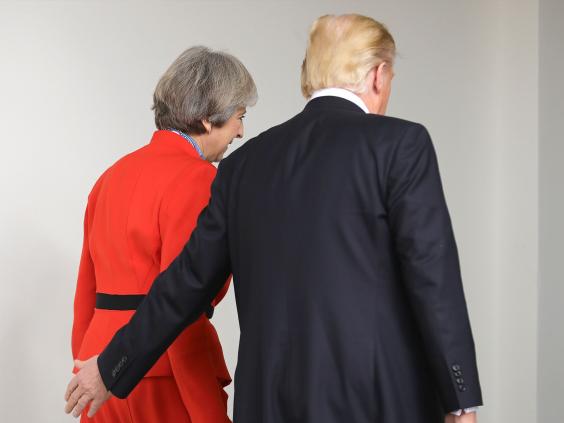The Special Relationship Won’t Save Boris Johnson
 On 26 July, on the first official phone call between Prime Minister Boris Johnson and President Donald Trump, both leaders agreed that Brexit offered an “unparalleled opportunity” to strengthen the UK-US special relationship. The conversation followed various exchanges of affection, flattery and praise between both men. Taken together with Foreign Secretary Dominic Raab’s recent trip to the US and National Security Advisor John Bolton’s visit to London, there is much hope that personal chemistry between the two administrations will reboot the special relationship after a rocky three years under Theresa May. For Brexit supporters and the government, close ties with Washington are seen as key to the UK flourishing outside the European Union.
On 26 July, on the first official phone call between Prime Minister Boris Johnson and President Donald Trump, both leaders agreed that Brexit offered an “unparalleled opportunity” to strengthen the UK-US special relationship. The conversation followed various exchanges of affection, flattery and praise between both men. Taken together with Foreign Secretary Dominic Raab’s recent trip to the US and National Security Advisor John Bolton’s visit to London, there is much hope that personal chemistry between the two administrations will reboot the special relationship after a rocky three years under Theresa May. For Brexit supporters and the government, close ties with Washington are seen as key to the UK flourishing outside the European Union.
The problem is, however, that the special relationship stopped being special a long time ago, and notions of its revitalisation after Brexit misunderstand the difficult and complex ties between both countries. While Britain continues to see itself as Washington’s natural ally, the pillars of this role began to crumble long ago. The special relationship shouldn’t continue to command so much sway in Downing Street, but it does. As geopolitical chimeras go it is quite remarkable.
Indeed, beneath the well-meaning rhetoric and genuine historical ties the UK-US relationship is now better defined by glossy platitudes outlined in press releases or spoken from podiums than concrete action. Take the US Secretary of State Mike Pompeo’s trip to London in May where he described the special relationship as the “beating heart of the entire free world”. Or President Trump’s June state visit where he praised the “greatest alliance the world has ever known”, while former Prime Minister Theresa May spoke of a “unity of purpose”. Even after Trump’s public humiliation of Sir Kim Darroch Downing Street managed to roll out the now predictable language of “shared history and values”. If this feels wearily formulaic, like a script, it’s because it is.
The UK-US relationship is a complicated one, long defined by an asymmetry of power, often punctuated by moments of chemistry between leaders – from the chummy boys club of Harold Macmillan and John F Kennedy, to the ideological soulmates of Margaret Thatcher and Ronald Reagan. During the Cold War these moments were reinforced by a common enemy in the Soviet Union, which in turn helped rally military, diplomatic and cultural ties. But there were always checks on UK influence and importance, epitomised by the humiliation at Suez in 1956 and the US invasion of Grenada in 1983. “ If I were there, Margaret, I’d throw my hat in the door before I came in,” said Reagan in a phone call to Thatcher after US troops stormed the Caribbean Commonwealth island-state without prior warning.
 After the Cold War relations diluted further. They have ebbed and flowed ever since. This really shouldn’t be surprising. Many of the traditional diplomatic and cultural ties that once bound both countries together have faded. New threats – terrorism, climate change, a rising China, a volatile Middle East, an opportunistic Russia etc – have revealed shared but also divergent interests and attitudes towards international politics. Bill Clinton and John Major clashed over Bosnia. George W Bush and Tony Blair bonded (albeit one-sidedly and catastrophically) over Iraq. Barack Obama called himself the first Pacific president and cared little for London. It is a long time since the ‘special relationship’ raised much of an eyebrow in Washington.
After the Cold War relations diluted further. They have ebbed and flowed ever since. This really shouldn’t be surprising. Many of the traditional diplomatic and cultural ties that once bound both countries together have faded. New threats – terrorism, climate change, a rising China, a volatile Middle East, an opportunistic Russia etc – have revealed shared but also divergent interests and attitudes towards international politics. Bill Clinton and John Major clashed over Bosnia. George W Bush and Tony Blair bonded (albeit one-sidedly and catastrophically) over Iraq. Barack Obama called himself the first Pacific president and cared little for London. It is a long time since the ‘special relationship’ raised much of an eyebrow in Washington.
What all this means is that while Trump’s foreign policy freelancing is certainly unpredictable, differences between the UK and US run deeper than just one president. Many are the product of an on-going structural shift – a transatlantic rebalancing – that has been taking place since the early 1990s. Previous presidents papered over these cracks by appealing to shared aspirations and at least paying lip service to the idea of partnership. It is a subtlety lost in Trump’s transactional Twitter diplomacy.
Which brings us back to Brexit. Can the UK’s decision to leave the EU really change these dynamics? After all, for most Leavers the success of ‘global Britain’ relies on a rejuvenated relationship with the US. It’s unlikely. In fact, in the long-run leaving the EU may make the UK less valuable to Washington. One of the main pillars of modern UK-US relations has been Britain’s role as an Anglo-American voice inside Brussels, promoting US-friendly interests. It is why Washington has long supported the UK’s place in the union.
Granted, the relevance of this ‘Atlantic bridge’ is easy to overplay. The US isn’t as engaged in Europe as it once was and the Trump administration is at odds with most of its foreign policy goals. Still, Brexit will remove what is left of this bridge entirely. If a US president wants to know what is happening in Europe they will call Berlin or Paris, not London. This shift was already underway during David Cameron’s rule. Concern that the UK was turning inward and neglecting its European security commitments (such as the Russia-Ukraine peace process), meant that if President Obama had a special relationship with anyone it was with Chancellor Angela Merkel of Germany.
As for issues of defence and intelligence, while the UK and US remain closely integrated the relationship is no longer so unique. Nor is it set in stone. There is little appetite (or capability, due to cuts) for the types of operation that would repeat the blunders of Iraq. The UK’s time as a junior partner to American military adventure is over. The US will continue to look for European strategic allies, particularly as it turns its attention toward Africa and the Asia-Pacific, but from Washington’s perspective it is France – thanks to its deployments across the Middle East and North Africa – that is increasingly seen as the reliable military actor prepared to take on leadership roles that others, UK included, are not.
Whatever type of Brexit the UK ends up with it will be a matter of doing more with less; its voice and influence no longer amplified by 27 other member states. Instead of parting the waves for a new, greater, ‘global Britain’, Brexit is more likely to tame its power. The UK risks jettisoning much of its remaining strategic value, only to replace it with years of internal bickering and naval gazing. It is a currency that is difficult, though not impossible, to recoup.
But it won’t be done through romanticising a special relationship with Washington. Economically it is a minefield. Trump may have promised an “ambitious free-trade agreement” but any deal is up to Congress and will be driven by US national interest at a time when the UK is most vulnerable. Politically, too, it is hard to see much policy convergence on big ticket issues unless the Johnson government plans a complete rewiring of UK foreign policy, making significant concessions for little in return.
So where does that leave us? Stuck between a disruptive US and a bruised but resilient EU, the UK may simply drift awkwardly in-between. The is because pining after a special relationship that never really was is a symptom of a much broader, deeper identity crisis. ‘Special relationship’, much like ‘global Britain’, is a slogan now used to avoid answering fundamental questions about the UK’s place in the world after Brexit. What kind of power does it want to project? What will its interests be? What does it need to advance and protect them? We don’t know because these conversations haven’t happened. There is no clarity.
Instead, half-baked nostalgia has filled in the blanks. This is not about empire or WW2, but rather about a time when the UK and US were seen as shaping global trends, norms and commerce. But this world – a reflection of unchecked US supremacy – is gone and there is no going back. Economic instability and protectionism are on the rise. So is competition amongst major and emerging powers. There is no special role awaiting the UK upon its exit from the EU.
In 1962 US Secretary of State Dean Acheson’s famously quipped that the UK had lost an empire but failed to find a role. He also gave a warning. “Britain’s attempt to play a separate power role apart from Europe, a role based on a ‘special relationship’ with the United States…this role is about played out.” Almost sixty years later it is a warning Brexiteers are failing to heed.

Let’s not forget whatever the deal that Chump’s 1 & 2, Bolton, Raab et al manage to cobble together they still have to face ‘The Wrath’ of Nancy who has made it very clear that if any agreement endangers the Good Friday Agreement then Chump 1 can kiss bye-bye as it won’t pass her or Congress. Without even any help from Nancy, there will be the wrath of the peoples of these islands who really hate their Christmas and New Year being ruined – especially by the Tories. Lesser events have lead to riots and Civil War in Englandshire.
TONY BENN
“What we call the Special Relationship is really a product of the fact that we depend upon the United States in Britain for nuclear weapons, nuclear power, and therefore we are really, to that extent, a subject nation. If we want to hang onto nuclear weapons we have to follow American policy and that causes a lot of frustrations and we call it the Special Relationship and it is really a position of subservience.” @ 11.30
The rest of the world’s view: ‘We normally get chocolates and flowers before we let someone do that to us.” ; )
– Tony Benn – 29.00 minutes – 25th January, 2013 – Voice of Russia radio – Link correction – now @Audioboom, 3 February 2013 –
– https://audioboom.com/posts/1191584-in-conversation-tony-benn
Tony Benn on the Special Relationship. Plus John le Carré , and Craig Murray on Perfidious Albion in Bahrain – See comments by “Ex Pat” to “Bahrain Opposition Meeting at Frontline Club,” by Craig Murray, 23rd February 2013 – Craig Murray blog –
https://www.craigmurray.org.uk/archives/2013/02/bahrain-opposition-meeting-at-frontline-club/#comment-395834
‘Naval’ gazing? I assume you meant navel gazing, but the inadvertent military reference was appropriate. I certainly wouldn’t downplay the role of ‘defence’ (a good example of Orwellian Newspeak). The military-industrial complex is at the core of the ‘special relationship’, and Israel and Saudi Arabia are important elements in this, so any discussion of the ‘special relationship’ should include them. There’s huge money involved, and therefore significant vested interests which won’t be surrendered easily. Liam Fox and Priti Patel are in it up to their eyeballs.
https://therealnews.com/stories/merchants-of-death-how-the-military-industrial-complex-profits-from-endless-war
https://weeklyworker.co.uk/worker/885/guarding-the-chicken-coop/
https://www.thenational.ae/opinion/comment/what-the-priti-patel-scandal-tells-us-about-the-dark-operations-of-the-uk-s-powerful-israel-lobby-1.675000